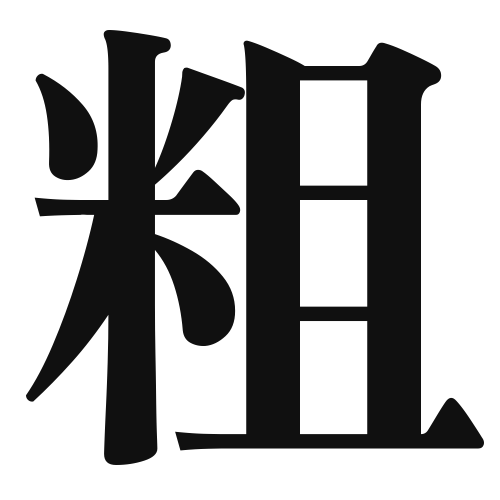1. Overview of Meaning
The kanji “粗” (pronounced “so” or “ara”) generally means “rough,” “coarse,” or “crude.” It describes something that is not finely made or is lacking in refinement.
2. Formation and Radical
Formation of the Kanji: The kanji “粗” is a phonetic-ideographic character (形声文字). It combines the radical for “grain” (禾) with a phonetic component that suggests its pronunciation.
Radical: The radical of “粗” is “禾,” which relates to plants or grains, indicating a connection to the natural world and raw materials.
3. Examples of Usage
Common Words and Phrases: Some frequently used words that include “粗” are “粗大ゴミ” (sodai gomi – bulky waste) and “粗品” (soshina – a small gift or token).
Example Sentences in Daily Conversation:
- この布は粗いので、肌に優しくないです。 (This fabric is coarse, so it’s not gentle on the skin.)
- 粗い仕事をしてしまった。 (I did a rough job.)
4. Synonyms and Antonyms
Similar Kanji: A similar kanji is “粗悪” (soaku), which means “inferior” or “poor quality.” While both “粗” and “粗悪” imply a lack of refinement, “粗悪” specifically refers to quality.
Antonyms: An antonym of “粗” is “細” (sai), which means “fine” or “thin,” indicating something that is delicate or well-crafted.
5. Cultural and Historical Background
Connection to Japanese Culture: The concept of “粗” is often reflected in traditional Japanese aesthetics, where simplicity and naturalness are valued. The idea of “wabi-sabi” embraces the beauty of imperfection, which aligns with the meaning of “粗.”
Proverbs and Idioms: One relevant proverb is “粗にして大を知る” (ara ni shite dai o shiru), which means “to know the great through the rough,” suggesting that one can learn important lessons from simple or rough experiences.
